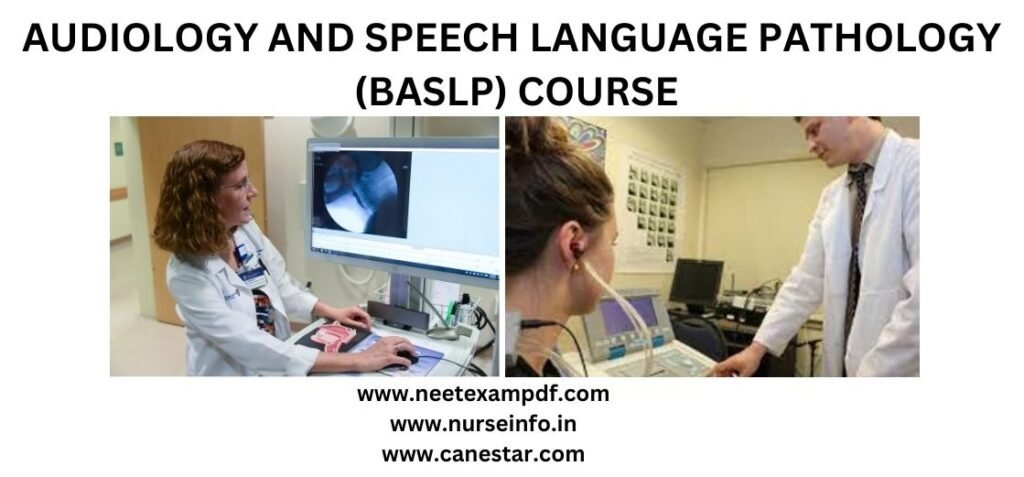AUDIOLOGY AND SPEECH LANGUAGE PATHOLOGY (BASLP) COURSE – COURSE, ELIGIBILITY, DURATION, COURSE CURRICULUM, FEE STRUCTURE, CAREER OPPORTUNITY (ABROAD) AND SALARY
(BASLP) COURSE
Audiology and Speech-Language Pathology are two separate but related fields that deal with the evaluation, diagnosis, and treatment of communication disorders.
In India, the eligibility criteria for audiology and speech-language pathology courses may vary slightly depending on the university or institution offering the program. However, here are some common eligibility requirements:
Educational Background: Typically, a bachelor’s degree in Audiology and Speech-Language Pathology or a related field is required for admission to a master’s degree program in India. The bachelor’s degree program should be from a recognized university or institution.
Minimum Marks: Most universities and institutions have a minimum percentage or CGPA requirement for admission. Generally, a minimum of 50% to 60% marks in the qualifying examination is required. The specific minimum marks required may vary among institutions.
Entrance Examinations: Many universities and institutions in India conduct entrance examinations for admission to audiology and speech-language pathology courses. These entrance exams may include subject-specific tests, aptitude tests, and interviews.
Some popular entrance exams for audiology and speech-language pathology in India are:
- All India Institute of Speech and Hearing (AIISH) Entrance Exam
- National Eligibility Cum Entrance Test (NEET) for Speech and Hearing
- Various state-level entrance exams conducted by different universities/institutions
State Domicile Criteria: In some states, there may be domicile requirements, meaning preference or reserved seats for candidates who are residents of that particular state. These criteria vary among states, and it’s important to check the specific guidelines of the institutions you are interested in.
Age Limit: Some institutions may have an upper age limit for admission to audiology and speech-language pathology courses. The age limit, if applicable, can vary among institutions.
DURATION
In India, the duration of Audiology and Speech-Language Pathology courses can vary depending on the level of study and the institution offering the program. Here are the typical durations for different levels of courses:
Bachelor’s Degree:
Bachelor of Audiology and Speech-Language Pathology (BASLP): The duration of the BASLP program is generally four years, including both theoretical coursework and clinical training.
Master’s Degree:
Master of Audiology and Speech-Language Pathology (MASLP): The duration of the MASLP program is typically two years. This includes advanced coursework, research, and extensive clinical practicum.
Doctoral Degree:
Doctor of Philosophy (Ph.D.): For individuals interested in pursuing research or academic careers, a Ph.D. in Audiology and Speech-Language Pathology is an option. The duration of a Ph.D. program can vary, but it generally takes around three to five years to complete.
COURSE CONTENT
The content of Audiology and Speech-Language Pathology courses can vary depending on the institution and the specific program. However, I can provide you with a general overview of the core topics and subjects covered in these courses. Here are some common areas of study:
- Basic Sciences:
Anatomy and Physiology of the Auditory and Speech Mechanisms: This course focuses on the structure and function of the auditory and speech systems, including the ear, vocal tract, and related neural pathways.
Acoustics and Psychoacoustics: Students learn about the physics of sound and its perception, including concepts such as frequency, intensity, and hearing thresholds.
- Communication Disorders:
Speech and Language Development: This course covers the typical development of speech and language in children, including milestones, phonological and morphological aspects, and language disorders.
Voice Disorders: Students learn about the assessment and treatment of voice disorders, such as vocal nodules, vocal fold paralysis, and other vocal pathologies.
Fluency Disorders: This course focuses on the evaluation and management of fluency disorders, including stuttering and cluttering.
Articulation and Phonology: Students learn about the assessment and treatment of articulation and phonological disorders, which involve difficulties in producing speech sounds.
Language Disorders: This course addresses various language disorders, including specific language impairment, autism spectrum disorder, and acquired language disorders.
Augmentative and Alternative Communication (AAC): Students learn about AAC systems and strategies used to enhance communication for individuals with severe communication impairments.
- Assessment and Intervention:
Diagnostic Methods and Assessment: This course covers various assessment techniques and tools used in audiology and speech-language pathology, including standardized tests, observation, and parent/teacher interviews.
Intervention Techniques: Students learn about evidence-based intervention approaches and techniques for communication disorders, including individual and group therapy, counseling, and technology-assisted interventions.
- Clinical Practicum:
Clinical Observation and Practice: Throughout the course, students gain hands-on experience in clinical settings, working under the supervision of licensed audiologists and speech-language pathologists. This provides them with opportunities to apply their knowledge and skills in real-world situations.
- Professional and Ethical Considerations:
Professional Ethics: Students learn about the ethical and legal considerations involved in the practice of audiology and speech-language pathology, including confidentiality, informed consent, and professional conduct.
Professional Issues and Practices: This course covers topics related to professional development, evidence-based practice, multicultural considerations, and current trends in audiology and speech-language pathology.
FEE STRUCTURE
The fee structure for Audiology and Speech-Language Pathology courses can vary significantly depending on the institution, level of study (bachelor’s, master’s, or doctoral), and the country where the program is offered. Additionally, fee structures can change over time, so it’s important to check with specific institutions for the most accurate and up-to-date information.
In India, the fee structure for Audiology and Speech-Language Pathology courses can vary among universities and colleges. Public institutions generally have lower fees compared to private institutions. The fee structure may also differ for students from different categories, such as general category, reserved category (SC/ST/OBC), or economically weaker sections (EWS).
To give you a rough idea, here’s a general range of fee structures in India:
- Bachelor’s Degree (BASLP):
Public Institutions: The annual tuition fees for a BASLP program in public institutions can range from approximately ₹20,000 to ₹50,000 or more.
Private Institutions: The annual tuition fees for BASLP programs in private institutions can range from approximately ₹50,000 to ₹1,50,000 or more.
- Master’s Degree (MASLP):
Public Institutions: The annual tuition fees for a MASLP program in public institutions can range from approximately ₹30,000 to ₹70,000 or more.
Private Institutions: The annual tuition fees for MASLP programs in private institutions can range from approximately ₹70,000 to ₹2,00,000 or more.
It’s important to note that these figures are approximate and can vary based on the specific institution, location, and other factors. Additionally, there may be additional expenses such as registration fees, examination fees, library fees, and laboratory charges, among others.
CAREER OPPORTUNITY
Audiology and Speech-Language Pathology offer diverse and rewarding career opportunities in various settings. Here are some of the career paths and settings available in these fields:
- Clinical Settings: Audiologists and Speech-Language Pathologists often work in clinical settings, including hospitals, rehabilitation centers, audiology clinics, speech and hearing clinics, and private practices. In these settings, they provide assessment, diagnosis, and treatment for individuals with communication disorders, hearing loss, and balance disorders.
- Educational Institutions: Many Audiologists and Speech-Language Pathologists work in educational settings such as schools, colleges, and universities. They may collaborate with teachers, special educators, and other professionals to support students with communication disorders, provide therapy services, and develop individualized education plans.
- Research and Academia: Some professionals pursue careers in research and academia. They work in universities, research institutes, and government agencies, conducting research on communication disorders, developing new assessment tools and intervention techniques, and contributing to the advancement of the field.
- Government and Healthcare Organizations: Audiologists and Speech-Language Pathologists may work in government agencies, public healthcare organizations, or nonprofit organizations dedicated to promoting communication health. They may be involved in public health initiatives, early intervention programs, and policy development related to communication disorders.
- Industry and Technology: Opportunities exist in the industry, particularly in the manufacturing and development of hearing aids, cochlear implants, and other assistive listening devices. Audiologists may work in product research and development, sales, or provide clinical support and training for these devices.
- Rehabilitation Centers: Audiologists and Speech-Language Pathologists may work in rehabilitation centers, including those focused on neurological rehabilitation. They may assist individuals with communication difficulties resulting from stroke, traumatic brain injury, or degenerative conditions.
- Telepractice: With the advancement of technology, there is a growing demand for telepractice services in audiology and speech-language pathology. Professionals can provide assessment, therapy, and consultation services remotely, reaching individuals in remote or underserved areas.
- Entrepreneurship and Private Practice: Some professionals choose to start their own private practices, offering audiology and speech-language pathology services independently. This allows for autonomy in clinical decision-making, the ability to specialize in specific areas, and potential business growth.
SALARY
The salary of Audiologists and Speech-Language Pathologists in India can vary based on factors such as experience, qualifications, location, type of employment, and the sector in which they work. It’s important to note that salary ranges provided here are approximate and can vary.
In India, the average annual salary of Audiologists and Speech-Language Pathologists is in the range of ₹3 lakh to ₹8 lakh. However, the salary can differ depending on the following factors:
- Experience: Entry-level professionals typically start with lower salaries, while those with several years of experience and expertise in specialized areas may command higher salaries.
- Qualifications: Higher qualifications, such as a master’s or doctoral degree, may lead to better salary prospects.
- Location: Salaries can vary depending on the city or region of employment. Metropolitan cities and urban areas may offer higher salaries compared to smaller towns and rural areas.
- Sector of Employment: Salaries may differ based on the sector of employment. For example, working in private clinics or hospitals may offer different salary packages compared to government organizations or educational institutions.
- Type of Employment: The type of employment can also impact salary. Audiologists and Speech-Language Pathologists may work as employees in hospitals, clinics, or educational institutions, or they may be self-employed in private practice.
SALARY ABROAD
The salary of Audiologists and Speech-Language Pathologists abroad can vary significantly depending on the country, level of experience, qualifications, cost of living, and the specific job setting. Here’s an overview of the salary ranges for these professionals in some countries:
- United States:
Entry-level Audiologists and Speech-Language Pathologists in the United States can expect an average salary of approximately $60,000 to $70,000 per year.
With experience, the salary can range from $70,000 to $90,000 or more annually.
Audiologists and Speech-Language Pathologists working in specialized settings or with advanced certifications can earn higher salaries, potentially exceeding $100,000 per year.
- United Kingdom:
In the United Kingdom, Audiologists and Speech-Language Pathologists typically earn an average salary of £25,000 to £40,000 per year.
With experience and advanced qualifications, salaries can range from £40,000 to £60,000 or more annually.
Salaries may be higher in the private sector or in London compared to other regions in the UK.
- Canada:
In Canada, Audiologists and Speech-Language Pathologists can expect salaries ranging from approximately CAD 60,000 to CAD 90,000 per year, depending on experience and location.
Salaries may vary by province, with higher salaries often seen in urban areas and metropolitan cities.
- Australia:
In Australia, Audiologists and Speech-Language Pathologists typically earn salaries in the range of AUD 60,000 to AUD 90,000 per year.
With experience and advanced qualifications, salaries can reach AUD 90,000 or more annually.
Salaries may vary depending on the state or territory and the specific job setting.
If you need more information, comment us below or email us.
Thank you.

